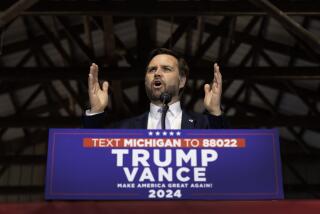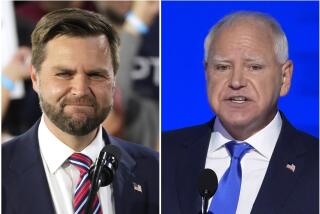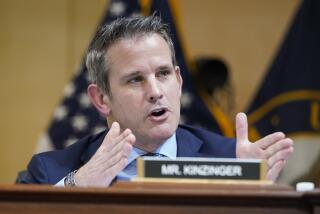NEWS ANALYSIS : GOP Not Ready to Paint ‘Quayle for President’ Signs : Politics: Former vice president is hinting at his White House plans. But party chiefs say ’96 is too early.
- Share via
LYNCHBURG, Va. — “Wherever I go, people want me to think about 1996, so I will,” Dan Quayle tells about 200 Republican loyalists gathered here for a fund-raising luncheon. Pausing to let the suspense build, he adds: “Let me be very clear. Bill Clinton will be a one-term President.” As if on cue, his audience bursts into cheers.
Quayle’s teasing reference to his plans for the 1996 campaign is more than just a setup for an applause line. As he himself acknowledges, the former vice president is giving “very serious consideration” to making a run for the White House. Between now and November’s congressional elections, he will visit about 30 states in what he calls “a conversation with the American people.”
And most who hear him on the stump come away convinced that Quayle has some things going for him--notably his early advocacy of “family values,” an issue that has been taking on increasing resonance in both parties. The former vice president is also an early favorite of conservative Christians, a major activist bloc in the Republican Party.
Yet for all his potential strengths, many Republican leaders and party operatives, including some of Quayle’s own erstwhile aides, say they think that he would be better off putting his presidential ambitions on hold for 1996. They believe that, even under the most favorable circumstances, he needs more time to rid himself of baggage, particularly the impression of immaturity, that dogged his vice presidency.
“The press has tagged him with an image as a lightweight,” said Michael Harrington, a former Lynchburg GOP official who heard Quayle speak here on behalf of Republican Oliver L. North, who is seeking to unseat Sen. Charles S. Robb (D-Va.). “And I don’t think he has yet overcome that perception.”
Quayle’s admirers point out that he has confounded his detractors in the past. His controversial “Murphy Brown” speech brought forth a chorus of catcalls in 1992. Yet the idea of “social sanctions” against women who bear children out of wedlock now has become conventional wisdom, embraced by voices as diverse as Atlantic Monthly magazine and Donna Shalala, secretary of health and human services in the Clinton Administration.
Even President Clinton, who once complained that he was “fed up” with politicians “lecturing” about family values, recently emphasized that theme himself, as Quayle has pointedly noted. “Welcome aboard, Mr. President,” he jibed at last month’s political strategy conference of the Christian Coalition.
On that occasion and in other recent appearances, Quayle has been spelling out a family values agenda that combines an assortment of carrots and sticks. To encourage marriage, he would eliminate the so-called marriage tax penalty. He would also reward couples who have children by boosting the tax deduction for their offspring and indexing that deduction to the rate of inflation.
On the other side of the ledger, he would eliminate all additional stipends to welfare mothers for children born out of wedlock, though he would leave the mothers themselves on the welfare rolls. “I know it sounds harsh,” he told a reporter after his talk here. “But I tell you what’s harsher: children who live in poverty generation after generation.”
Should Quayle seek the GOP nomination, he would have the “inside track” on gaining the backing of conservative Christians, according to Ralph Reed, director of the Christian Coalition, the most potent of the groups on the religious right.
“Our people appreciate his willingness to stand tall for them when these ideas were not popular,” Reed said.
But another influential Christian conservative, the Rev. Jerry Falwell, said he does not believe that Quayle nor any other candidate for the GOP nomination is in a position to monopolize support among Christian conservatives as Ronald Reagan did in 1980.
“I don’t see a Ronald Reagan out there now,” said Falwell, who sat at the head table at the Lynchburg fund-raising lunch for North. He said half a dozen other Republican presidential possibilities also could appeal to religious conservatives.
And despite the “Murphy Brown” episode, some conservative Christians question the strength of Quayle’s commitment to their cause. “I think that he wants to be all things to all people,” said Martin Mawyer, head of the Christian Action Network, a lobbying group that claims 80,000 supporters around the country.
Mawyer points to Quayle’s complaint in his best-selling book, “Standing Firm,” that “strident behavior” at the 1992 Republican National Convention in Houston hurt the GOP ticket. Mawyer said Quayle was trying to “distance himself” from religious conservatives with his book, while trying to “endear himself” to them in his travels around the country.
Whatever the merits of this criticism, the stress on family values is only one aspect of the 47-year-old Quayle’s political profile, shaped by a career that already has been shaken by more turbulence than most politicians endure in a lifetime.
Quayle got off to a strong start. Though raised in privilege as the scion of a newspaper publishing dynasty, he demonstrated an affinity for the rough-and-tumble of politics, knocking off an eight-term Democratic incumbent in Indiana to gain a seat in the House in 1976. After only two terms there he unseated another long-entrenched Democrat, Birch Bayh, to enter the Senate.
A big Senate reelection victory in 1986, combined with Quayle’s boyish good looks and his rock-hard conservatism, boosted him onto the Republican ticket in 1988 as George Bush’s running mate. But his abrupt arrival on the national scene was spoiled by allegations that years before he had used family influence to join the National Guard, thus lessening his chances of service in the Vietnam War.
Quayle spent the next four years trying to recover from the damage inflicted by that early furor, loyally carrying out his vice presidential duties at home and abroad. He never fully succeeded in washing the slate clean--partly because of sometimes-unfair criticism, partly because of his own gaffes.
Nevertheless Quayle emerged from this four-year crucible seasoned and hardened by his difficulties and with a number of political assets. These included a network of allies among Republicans leaders he had met during his vice presidential travels and a base of support among conservative activists, drawn to him by shared beliefs and shared enemies, particularly among the so-called liberal media.
In personal terms, Quayle is also well positioned to seek the presidency. A substantial advance from his book, which has sold more than 500,000 copies since it was published in May, provides a financial cushion. He gets additional income from frequent speeches to business groups and colleges and from a small investment firm, Circle Investors, of which he is chairman.
He is also involved, along with his former national security adviser, Karl Jackson, with two consulting firms, Global Alliances and FX Strategic Advisers, which provide advice on economic conditions abroad.
His role as a member of the board of trustees of the Hudson Institute, a conservative think tank, and chairman of its competitiveness center gives him continued access to the world of international and domestic policy development. An Indianapolis-based political action committee, Issues ‘94, directed by a former vice presidential staffer, Anne Hathaway, finances his political travels.
His continued campaigning for fellow Republicans is giving Quayle exposure in places that will be important battlegrounds in the 1996 contest for the Republican nomination and is helping him gather IOUs from GOP politicians who would be allies in 1996.
In his appearances, overtly political and otherwise, Quayle sometimes tries to deal with the difficulties of his vice presidency with self-deprecating humor, some of it heavy-handed. Addressing a Hudson Institute luncheon honoring Bush’s former national security adviser, Brent Scowcroft, Quayle claimed that he asked Scowcroft: “How do you want to handle this?”
Whereupon Scowcroft supposedly suggested following the pattern they had used when both served in the White House. “You give the speech and I’ll clean up afterward.”
One peril for Quayle as he tests the political waters is that his itinerary often includes encounters with his longtime adversaries, the media.
“They really want me to come back in the arena,” Quayle said recently. “They are ready for me. I am ready for them, if I choose to run. And I can’t wait.”
Bravado aside, Quayle at times does seem at ease with the press and at other times goes well out of his way to avoid controversy. The day before he stumped for North in Lynchburg, Quayle was asked at a Washington press conference whether he considered the former national security aide to be “a hero” in the Iran-Contra affair. Quayle seemed thrown on the defensive and his answer evoked memories of the celebrated description of him as “a deer caught in the headlights.”
“I wasn’t in the White House at that time,” he replied. “As a matter of fact, I never met Oliver North. I will meet him for the first time tomorrow. I know him by reputation. Our paths have never crossed. So I can’t answer that question because I really don’t know.”
The next day, Quayle expressed confidence that North would do well in the Senate if Virginia voters decide to send him there, and his previous emphatic disclaimer was overlooked.
But if he should formally declare for the presidency, nearly everything he says will come under intense scrutiny, and any similar comments suggesting a lack of assurance or poise would only serve to reinforce existing doubts about his electability--doubts that exist even among his admirers.
“I would think he might be better off for his long-term future to not run this time and to spend his efforts helping the party as he is doing now,” said Ernest Angelo, a longtime Republican national committeeman from Texas. Though Angelo rates Quayle highly and thinks he got a “bum rap” as vice president, “with the general public I think he still has some problems.”
Sen. Richard G. Lugar (R-Ind.) said he suggested to Quayle that he get elected governor of Indiana as a way of re-establishing his political identity before plunging into the presidential sweepstakes.
Skepticism about Quayle’s presidential prospects is shared by former Quayle staff members, including his former chief of staff, William Kristol, who said he believes that Quayle would have trouble raising the money to run a successful campaign for the presidency.
“He’ll get a lot of people who are willing to give him $1,000 because they like him,” said Kristol, who now heads the Project for the Republican Future, an advocacy and strategy group. “What they won’t do is go out and raise $10,000 from their friends.”
Al Hubbard, former deputy chief of Quayle’s vice presidential staff and now party chairman for his home state of Indiana, conceded that many “party insiders and major donors” are “handicapping the race” and have concluded that Quayle would face “too big a hill for him to climb.”
But he pointed out: “These are the people who said Richard Nixon was washed up and said Bill Clinton would never get off the ground.”
If Quayle decides to run, Hubbard insisted, he would win over these skeptics in time and oblige the press to take him seriously.
“What Quayle has that no one can question is a steadfastness, a sincerity which he demonstrated for four years. He has proven that he is someone who will absolutely stand up for what he believes in, and that’s what the American people want.”
Times staff writer David Lauter contributed to this story.
More to Read
Get the L.A. Times Politics newsletter
Deeply reported insights into legislation, politics and policy from Sacramento, Washington and beyond. In your inbox twice per week.
You may occasionally receive promotional content from the Los Angeles Times.










